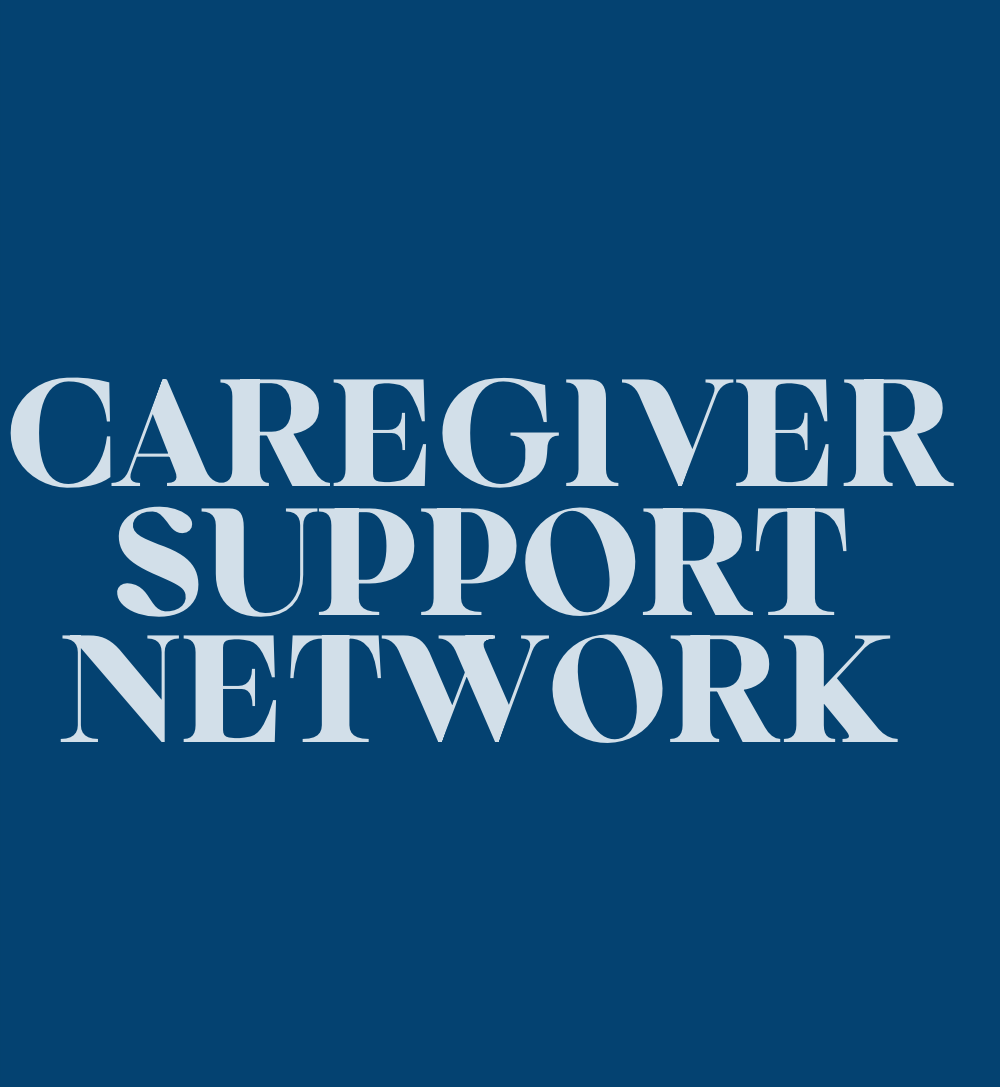Dementia Care
Engaging Dementia Activities for Your Parent: A Step-by-Step Guide
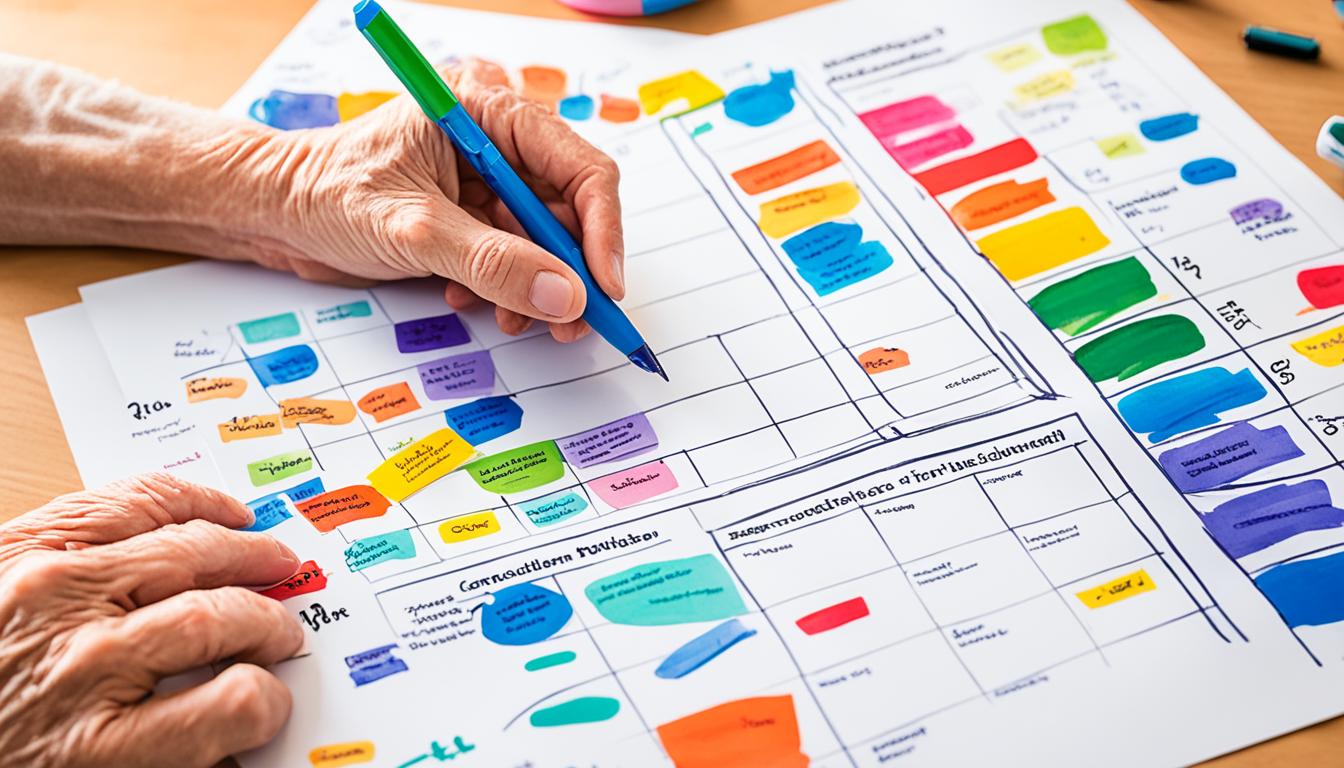
Did you know engaging in enriching activities can greatly enhance the joy and cognitive engagement of your parent who has dementia? Navigating the complexities of dementia can be overwhelming, but incorporating dementia-friendly activities into their daily routine can significantly improve their life quality. From experimenting with various sounds to enjoying virtual videos with the family, there’s a plethora of options for offering your loved one meaningful experiences. In this article, we’re going to explore a variety of intriguing activities tailored to suit the interests and abilities of individuals with dementia.
Key Takeaways:
- Engaging in stimulating activities can enhance the joy and cognitive engagement of individuals with dementia.
- Activities should be tailored to the interests and abilities of your loved one.
- Recommended activities include experimenting with sounds, visual expression through painting and drawing, sensory craft experiences, and more.
- Reminiscing through classic movies, music, photo albums, and magazines can also be meaningful activities.
- Cognitive activities, sensory experiences, creative outlets, group activities, and technology-based experiences can all contribute to the well-being of individuals with dementia.
Tips for Planning Activities for Seniors with Dementia
When planning activities for seniors with dementia, it’s crucial to consider their cognitive abilities, interests, and the progression of their condition. By tailoring activities to their unique needs, you can create engaging and age-appropriate experiences that promote well-being and reduce distress.
Keep it Simple and Enjoyable
To minimize frustration and anxiety, choose activities that are simple, enjoyable, and familiar to your loved one. Opt for tasks that they can easily understand and complete, providing a sense of accomplishment and boosting their self-confidence. Remember, it’s the process of engagement that matters, not the end result.
Match Activities to Cognitive Abilities
In the early stages of dementia, focus on activities that help retain independence and cognitive abilities. Consider tasks that tap into their existing skills and hobbies. As the disease progresses, adapt activities to their changing abilities, making them more structured and tailored to their current cognitive level.
Choose Failure-Free Activities
It’s essential to select activities that match their ability level and minimize the risk of failure. Failure-free activities allow your loved one to engage without feeling overwhelmed or discouraged. Look for tasks that provide clear instructions, require minimal supervision, and accommodate any limitations caused by their dementia.
Stimulate the Senses and Memories
Engaging the senses can enrich the activity experience for individuals with dementia. Incorporate sensory elements such as textures, scents, and familiar sounds, as they can help evoke memories and create a more immersive and meaningful experience. For example, listening to their favorite music or handling textured objects can enhance their engagement and enjoyment.
Remember, the goal of planning activities for seniors with dementia is to provide them with a sense of purpose, connection, and enjoyment. By tailoring activities to their abilities and preferences, you can create meaningful experiences that promote their overall well-being.
15 Fun Activities for Elderly Dementia Patients
Engaging in stimulating activities is not only beneficial for elderly dementia patients but can also bring joy and enhance their cognitive abilities. Here are 15 enjoyable and stimulating activities you can try with your loved ones:
- Going for walks: Take a leisurely stroll in a park or around the neighborhood to enjoy fresh air and gentle exercise.
- Planting flowers: Engage in gardening activities, such as planting colorful flowers, to stimulate the senses and promote relaxation.
- Feeding the birds: Set up a bird feeder in the backyard or visit a local park to watch birds and connect with nature.
- Folding laundry: Involve them in simple household tasks like folding laundry, which provides a sense of accomplishment and purpose.
- Listening to music: Play their favorite songs or music from their era to evoke memories and create a soothing atmosphere.
- Looking at family photo albums: Flip through old photo albums together and encourage them to share stories and reminisce.
- Preparing afternoon tea: Bond over the ritual of preparing a cup of tea or coffee, complete with their favorite biscuits or treats.
- Watching favorite sports or movies: Enjoy watching their preferred sports events or movies together, providing entertainment and engagement.
- Playing with playdough: Engage their tactile senses by providing playdough to mold, squeeze, and create different shapes and objects.
- Doing puzzles: Work on puzzles together, selecting options that match their ability level and provide mental stimulation.
- Playing board games like Guess Who? and Battleship: Have fun with classic board games that require strategic thinking and social interaction.
- Having a remote-controlled pet: Consider getting a lifelike remote-controlled pet as a companion, offering comfort and amusement.
- Creating artwork: Encourage them to engage in art activities like painting or drawing to stimulate their creativity.
- Trying out sensory activities: Explore different sensory experiences, such as feeling different textures, smelling familiar scents, and tasting favorite flavors.
- Engaging in gentle exercises: Incorporate light exercises like stretching or seated movements to promote physical well-being.
By engaging in these activities, you can create meaningful moments and enhance the quality of life for your loved ones with dementia.
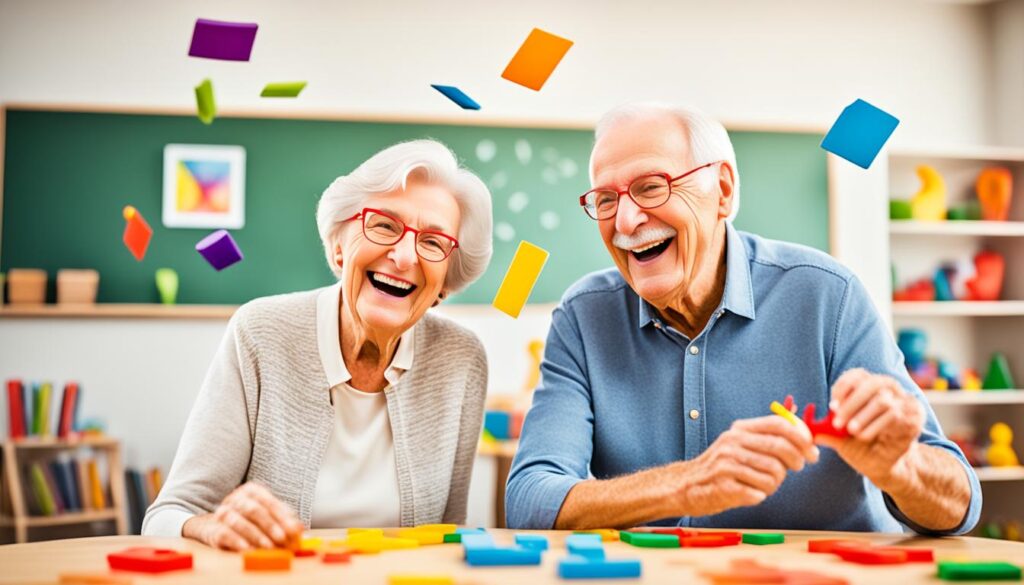
6 Sensory Activities for Dementia Patients
Sensory activities can greatly benefit individuals with dementia by stimulating their senses and evoking fond memories. Engaging in these activities can provide a source of comfort, joy, and cognitive stimulation for your loved ones. Here are six sensory activities that you can try:
- Surrounding them with familiar scents: Fill the air with the aroma of their favorite smells, such as fresh-cut grass or the fragrance of warm bread baking in the oven. Scents can evoke strong emotions and trigger pleasant memories.
- Touching familiar objects: Encourage your loved one to interact with objects that hold personal significance, like keys or hand-embroidered beads. By touching and feeling these objects, they may experience a sense of familiarity and comfort.
- Tasting favorite foods: Prepare their favorite dishes or flavors that hold sentimental value. Tasting these familiar flavors can evoke emotions and trigger memories associated with them.
- Feeling different textures: Provide various textures for sensory exploration, such as animal fur or the sensation of damp soil and leaves. Running their fingers through different textures can be both engaging and calming.
- Listening to soothing music: Create a calming environment by playing their favorite songs or soothing melodies. Music has the power to evoke emotions and bring back cherished memories.
- Engaging in gentle massages: Use light, comforting touch to soothe and relax your loved one. Massages can help promote a sense of calmness and well-being.
These sensory activities can be adapted and customized based on your loved one’s preferences and abilities. Remember to observe their reactions and adjust the activities accordingly to ensure their comfort and enjoyment.
By incorporating sensory activities into your caregiver routine, you can provide meaningful experiences and enhance the quality of life for individuals with dementia.

2 Creative Activities for Dementia Patients
Engaging in creative activities can offer numerous therapeutic benefits for seniors with dementia. Through artistic expression, individuals are able to communicate their emotions and find comfort within their creative pursuits. Here are two meaningful and engaging activities that can stimulate the creativity of dementia patients:
1. Painting and Drawing
Encouraging dementia patients to paint and draw provides them with a safe and expressive outlet to convey their feelings. This artistic endeavor allows them to communicate and connect with their emotions, even if they struggle with verbal communication. It’s important to provide large surfaces and bold colors to enhance their creative experience. By immersing themselves in the process of painting and drawing, individuals with dementia can find solace and tranquility in their art.
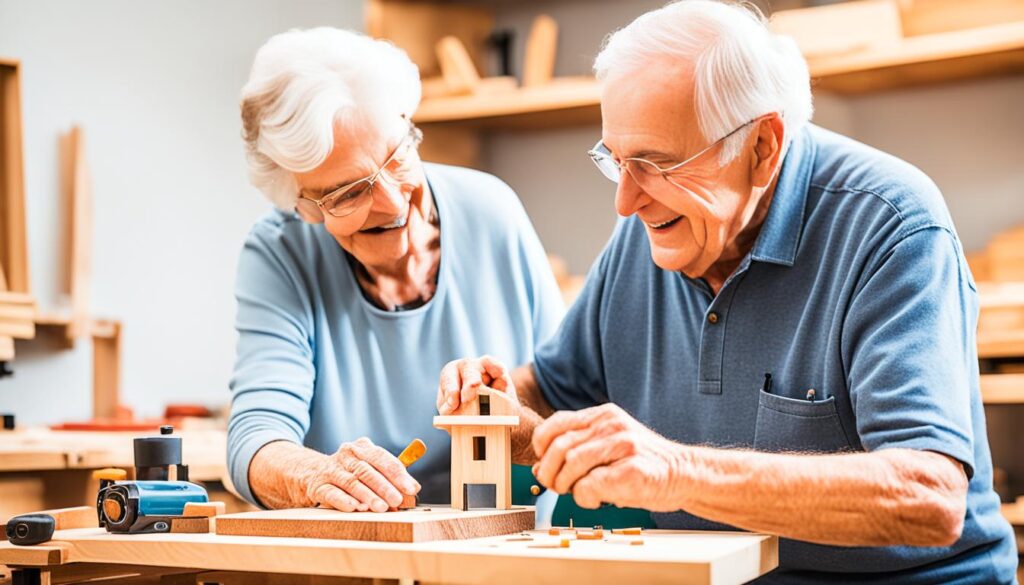
2. Collage Making
Engaging in collage-making activities can capture the attention of dementia patients and spark their creativity. Using images from magazines or old family photos, they can piece together a visual representation of their memories. This sensory experience allows them to revisit familiar moments and engage both their tactile and visual senses. As they carefully select and arrange the images, they are taken on a journey down memory lane, fostering their creativity and encouraging cognitive engagement.
Creative activities such as painting, drawing, and collage making have therapeutic benefits for individuals with dementia. These activities allow them to express their emotions, engage their senses, and foster creativity, providing a meaningful and enjoyable experience.
5 Group Activities for Dementia Patients
Group activities play a vital role in the therapeutic journey of dementia patients. These activities not only provide engagement and stimulation but also foster social interaction and a sense of camaraderie. As caregivers, we can create an environment that promotes connection and joy through group activities tailored to the needs of our loved ones.
1. Balloon Volleyball
Engage dementia patients in a friendly game of Balloon Volleyball. This low-impact activity enhances hand-eye coordination and promotes physical movement. With a soft balloon and a net or rope as a makeshift court, this enjoyable game can bring back cherished memories of friendly competitions.
2. Balloon Whack with Pool Noodles
Encourage dementia patients to participate in Balloon Whack using colorful pool noodles as paddles. This interactive activity stimulates motor skills and coordination while providing a fun way to engage with others. The gentle motion and cheerful colors make it an engaging and therapeutic experience.
3. Sing-alongs with Songs from the Patients’ Era
Music has a powerful effect on individuals with dementia, evoking memories and emotions. Create a personalized playlist of songs from the patients’ era and host a sing-along session. Singing together not only triggers fond memories but also fosters a sense of community and emotional well-being.
4. Gardening Together
Engage dementia patients in gardening activities, such as planting flowers or tending to a small vegetable garden. The sensory experience of touching the soil, smelling the plants, and nurturing living things can be incredibly therapeutic. Group gardening activities offer a sense of purpose, connection with nature, and an opportunity for social interaction.
5. A Shared Fish Tank for Visual Stimulation and Care
A shared fish tank provides visual stimulation and a calming atmosphere for dementia patients. Watching the fish swim and observing the vibrant colors can reduce anxiety and improve overall well-being. Encourage patients to participate in the care of the fish, such as feeding them or cleaning the tank together. This activity promotes a sense of responsibility and engagement with the natural world.
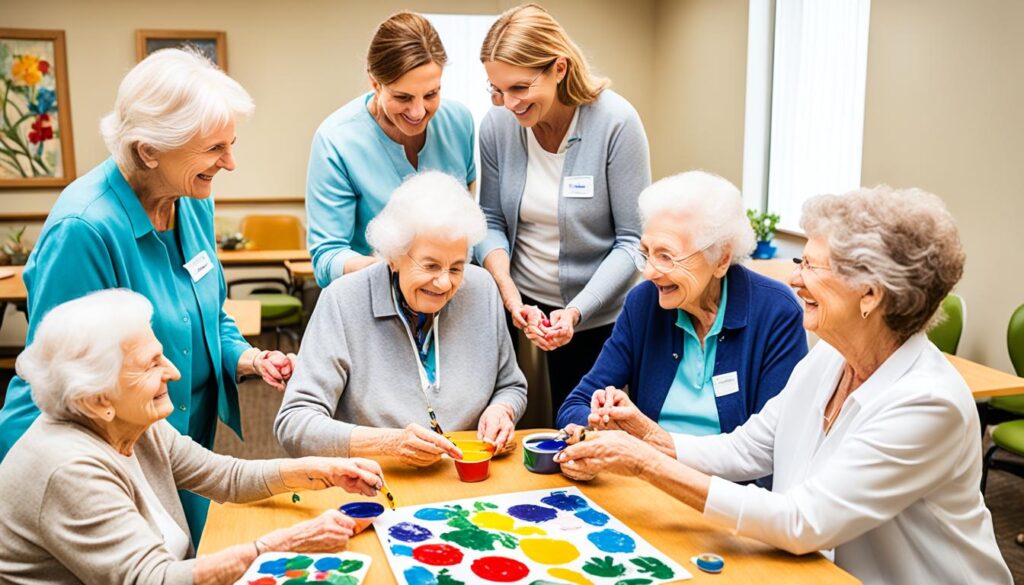
Engaging in group activities that promote social interaction and a sense of camaraderie can greatly enhance the well-being of dementia patients. From friendly games to shared hobbies, these activities create opportunities for connection and joy. As caregivers, we play a crucial role in providing therapeutic and engaging experiences for our loved ones.
2 Cognitive Activities for Dementia Patients
Engaging in cognitive activities can greatly benefit dementia patients by stimulating their memory and cognitive skills. These activities not only provide mental stimulation but also offer opportunities for meaningful connections and reminiscing.
Looking Through Photo Albums and Engaging in Conversation
Looking through photo albums can be a powerful cognitive activity for dementia patients. By reminiscing and discussing past memories, patients can exercise their recall and storytelling abilities. As caregivers, we can join in the conversation, encouraging them to share their thoughts, emotions, and personal experiences.
“The joy of looking through old photo albums and sharing stories about our lives can create a sense of nostalgia and bring back cherished memories. It’s a beautiful way to connect with our loved ones and foster a sense of belonging.”
To make this activity even more engaging, you can organize the photo albums by themes or periods of their life. For example, you could create an album dedicated to family vacations or a specific decade. By focusing on specific topics, you can prompt more focused discussions and help trigger memories associated with those particular events or periods.
Completing Puzzles Together
Puzzles are not only a popular pastime but also an excellent exercise for the brain. Completing puzzles together with dementia patients can provide a sense of accomplishment while promoting cognitive abilities such as problem-solving, spatial awareness, and attention to detail.
“Working on puzzles with our loved ones can be a fun and engaging activity that stimulates their minds and encourages focus and concentration. It’s also an opportunity for us to bond and enjoy each other’s company.”
When choosing puzzles, opt for ones with larger and visually appealing pieces to make them more accessible for dementia patients. Select the appropriate difficulty level based on their cognitive abilities, ensuring the puzzles provide a reasonable challenge without leading to frustration.
Remember to create a calm and comfortable environment during puzzle time. Play soft background music, provide adequate lighting, and eliminate any distractions that may disrupt their concentration.
| Cognitive Activity | Benefits |
|---|---|
| Looking Through Photo Albums | – Stimulates memory recall – Enhances storytelling abilities – Fosters emotional connection |
| Completing Puzzles | – Improves problem-solving skills – Enhances spatial awareness and attention to detail – Provides a sense of accomplishment |
By incorporating these cognitive activities into the daily routine of dementia patients, we not only provide them with mental stimulation but also create meaningful moments of connection, joy, and engagement.
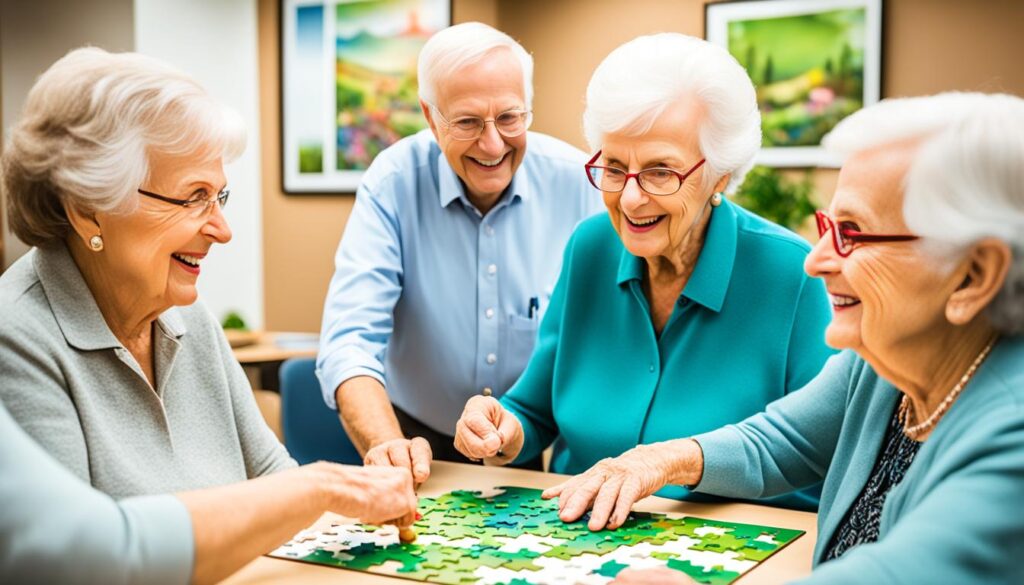
Technology-Based Dementia Activities for Seniors
Embracing technology can provide a wide range of engaging and mentally nourishing experiences for seniors with dementia. We understand that finding suitable activities for your loved ones can be challenging, which is why we’ve compiled a list of technology-based activities that can help boost memory and provide entertainment.
1. Explore with Live Cams
Using live cams, seniors can virtually explore various locations and observe nature and art. Whether it’s watching live animal cams at the zoo or taking a virtual tour of famous museums, this activity can provide a sense of adventure and discovery.
2. Journey with Google Earth
With Google Earth, seniors can embark on virtual journeys to familiar places or dream destinations. They can revisit their childhood home or virtually wander through scenic landscapes, triggering memories and imagination.
3. Create a Family Video Tablet
A family video tablet can be a source of comfort and entertainment for dementia patients at home. Collect and compile personalized videos from family members, capturing special moments, messages of love, and familiar faces. Watching these videos can evoke memories and foster a sense of connection.

| Activity | Benefits |
|---|---|
| Explore with Live Cams | Provides virtual adventures and sparks curiosity |
| Journey with Google Earth | Allows seniors to virtually visit familiar or dream locations |
| Create a Family Video Tablet | Offers comfort, entertainment, and a sense of connection |
Conclusion
Engaging in activities that enhance cognitive health and emotional comfort for seniors with dementia can greatly improve their quality of life. By tailoring activities to their interests and abilities, and focusing on sensory experiences, creativity, cognitive stimulation, social interaction, and technology-based experiences, caregivers can provide meaningful and joyful experiences for their loved ones with dementia.
Meaningful activities for dementia patients involve tapping into their individual preferences and past experiences. Encouraging creative outlets such as painting, drawing, and collage-making allows them to express themselves, while engaging in stimulating cognitive activities like completing puzzles and reminiscing boosts memory and cognitive skills. Incorporating sensory activities, such as smelling familiar scents and feeling different textures, can evoke memories and provide comfort. Group activities and technology-based experiences also foster social interaction and mental engagement.
Remember, every person with dementia is unique, so it’s essential to observe their responses and adjust the activities accordingly. Engaging in these activities not only benefits your loved one’s cognitive and emotional well-being, but it also strengthens the bond between you and creates memorable moments together. So go ahead, make a difference in their lives by incorporating meaningful and engaging activities into their daily routines.
Some engaging activities for a parent with dementia include experimenting with sounds, visual expression through painting and drawing, exploring sensory craft experiences, and creating collages using old images. Reminiscing through classic movies, listening to music, looking through photo albums, and journeying back in time by exploring old magazines can also be meaningful activities for your parent. Folding laundry, engaging in handy activities, untying knots, doing puzzles, playing games, and using technology-based activities like live cams and virtual family videos can provide cognitive stimulation and entertainment. Sensory activities such as smelling familiar scents, touching familiar objects, tasting familiar flavors, and feeling different textures can be invigorating for individuals with dementia. When planning activities for seniors with dementia, it’s important to consider their cognitive abilities, interests, and the progression of their condition. Activities should be simple, enjoyable, and familiar to reduce frustration and anxiety. For individuals in the early stages of dementia, activities that retain their independence and cognitive abilities are recommended. As the disease progresses, activities should become more structured and tailored to their current abilities. It’s important to choose failure-free activities that match their ability level, are low-maintenance with simple steps, and provide a sense of accomplishment. Activities should also be stimulating, engaging the senses and memories.
Fun activities for elderly dementia patients can include going for walks, planting flowers, feeding the birds, engaging in simple household tasks like folding laundry, listening to music, looking at family photo albums, preparing afternoon tea, watching favorite sports or movies, playing with playdough or doing puzzles, playing board games like Guess Who? and Battleship, and even having a remote-controlled pet for companionship and amusement.
Sensory activities can be particularly beneficial for individuals with dementia. These activities stimulate the senses and evoke fond memories. Suggestions for sensory activities include surrounding your loved one with familiar scents, such as fresh-cut grass or the aroma of warm bread, touching familiar objects like keys or hand-embroidered beads, tasting favorite foods that may elicit emotions and memories, and feeling different textures like animal fur or damp soil and leaves.
Creative activities can provide emotional expression and therapeutic benefits for dementia patients. Painting and drawing can be a safe and creative way for individuals with dementia to express their feelings. Encouraging the use of bold colors on big surfaces and providing materials like clay for tactile stimulation can also be enjoyable activities. Additionally, creating collages using images from magazines or old family photos can enhance their creativity and engagement.
Group activities can be particularly beneficial for dementia patients, as they provide social interaction and a sense of camaraderie. These activities can include balloon volleyball, balloon whack with pool noodles, sing-alongs with songs from the patients’ era, gardening together, and having a shared fish tank for visual stimulation and care. Engaging in cognitive activities can help stimulate memory and cognitive skills in dementia patients. Two suggested cognitive activities are looking through photo albums and engaging in conversation about past memories and subjects of interest, as well as completing puzzles together that are entertaining and cognitively beneficial.
Embracing technology can provide a wide range of engaging and mentally nourishing experiences for seniors with dementia. Suggestions include using live cams to explore nature and art, venturing globally with Google Earth to visit familiar places or dream destinations, and creating a family video tablet with personalized videos to provide comfort and entertainment for dementia patients at home.
Engaging in activities that enhance cognitive health and emotional comfort for seniors with dementia can greatly improve their quality of life. By tailoring activities to their interests and abilities, and focusing on sensory experiences, creativity, cognitive stimulation, social interaction, and technology-based experiences, caregivers can provide meaningful and joyful experiences for their loved ones with dementia.
FAQ
What are some engaging activities for a parent with dementia?
What are some tips for planning activities for seniors with dementia?
What are some fun activities for elderly dementia patients?
What are some sensory activities for dementia patients?
What are some creative activities for dementia patients?
What are some group activities for dementia patients?
What are some cognitive activities for dementia patients?
What are some technology-based dementia activities for seniors?
How can engaging activities improve the quality of life for dementia patients?
Dementia Care
Dementia Brain Scan Vs Normal: A Comparative Analysis
A glimpse into brain scans reveals stark disparities between dementia and normal brain function, inviting a captivating journey into unraveling neurological complexities.
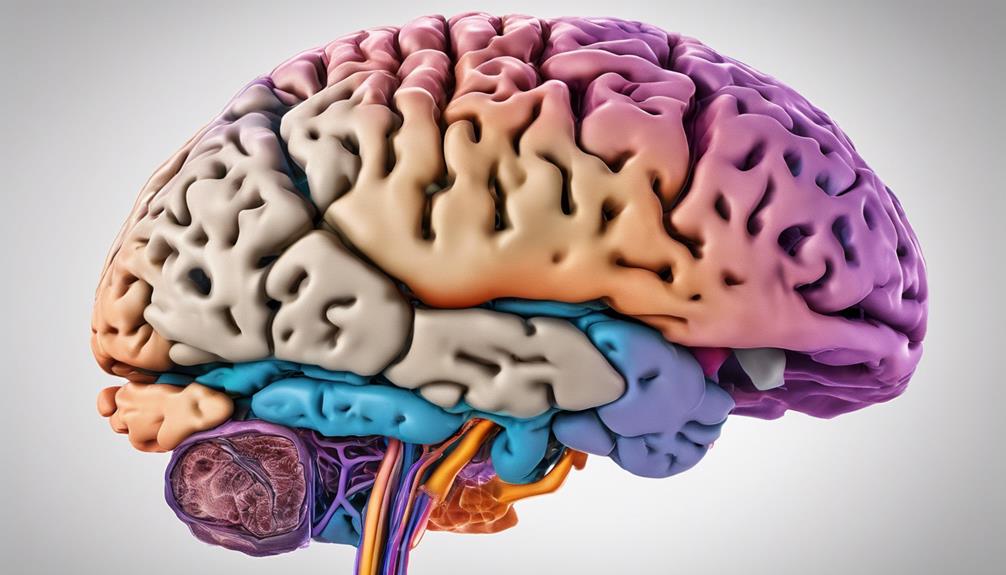
Investigating the realm of brain imaging with the goal of differentiating normal brain function from dementia,
the intricate details revealed by these imaging techniques offer a fascinating glimpse into the complexities of the human brain.
The stark disparities observed between dementia-afflicted brains and those with normal cognitive function serve as a compelling starting point for a deeper exploration of how these scans can unravel the mysteries of neurological disorders.
The subtle nuances captured in these images hold the key to unraveling the intricate web of differences between a healthy brain and one grappling with the challenges of dementia.
Key Takeaways
- Brain atrophy indicates dementia progression.
- Enlarged ventricles signify tissue loss in dementia.
- Structural abnormalities disrupt neuronal communication in dementia.
- White matter lesions in dementia scans indicate brain damage.
Types of Brain Imaging Scans for Dementia
When diagnosing dementia, various brain imaging modalities, such as CT scans and MRIs, play a pivotal role in detecting structural abnormalities and changes indicative of the condition. CT scans utilize X-rays to capture detailed images of the brain, highlighting any structural irregularities associated with dementia.
Conversely, MRIs offer high-resolution images that aid in identifying brain atrophy, stroke damage, and other dementia-related alterations. Additionally, functional imaging techniques like PET scans, SPECT, and fMRI are instrumental in assessing brain function and blood flow, providing valuable insights into the physiological changes occurring in dementia patients.
These imaging modalities not only assist in the early detection of dementia but also contribute to accurate diagnosis and monitoring of disease progression by detecting biomarkers such as amyloid plaques. By utilizing a combination of these imaging tools, healthcare providers can offer comprehensive care to individuals with dementia, facilitating timely interventions and personalized treatment strategies.
Key Differences in Dementia Brain Scans
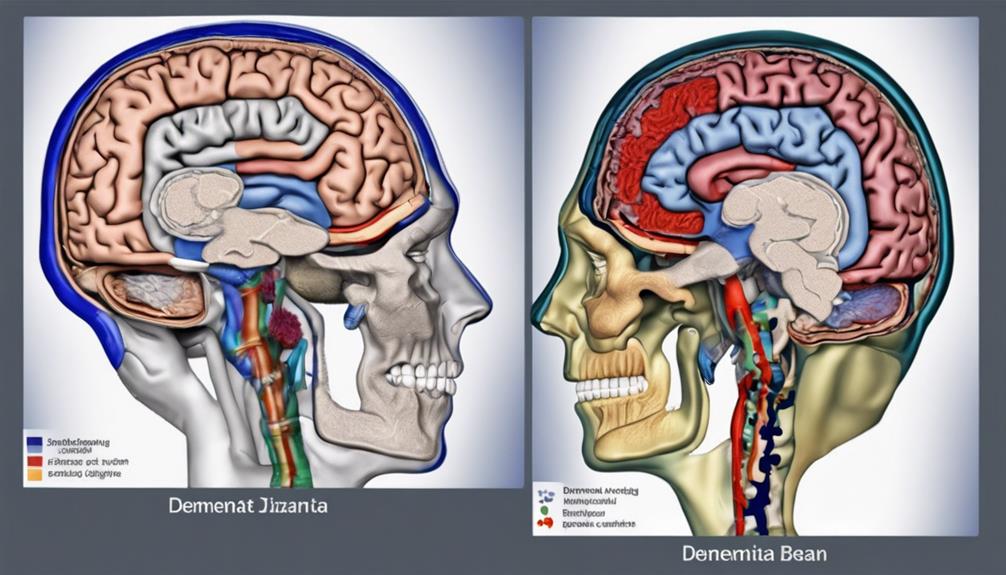
In dementia brain scans, significant indicators such as brain atrophy, ventricle enlargement, and abnormal structures like plaques and tangles are commonly observed. These abnormalities provide crucial insights into the underlying changes associated with dementia.
- Brain Atrophy: Dementia brain scans often reveal a reduction in brain volume, particularly in regions responsible for memory and cognition. This shrinkage is indicative of neuronal loss and can impact overall brain function.
- Ventricle Enlargement: Enlarged ventricles, the fluid-filled spaces in the brain, are frequently seen in dementia scans. This enlargement reflects brain tissue loss and can affect the brain's ability to regulate cerebrospinal fluid, potentially leading to cognitive decline.
- Abnormal Structures: The presence of plaques and tangles in dementia brain scans is a hallmark of diseases like Alzheimer's. These abnormal protein deposits disrupt neuronal communication and contribute to cognitive and behavioral changes in patients.
Analyzing these key differences in dementia brain scans aids in diagnosing the condition early and devising appropriate treatment strategies to address both structural and functional abnormalities.
Importance of Early Dementia Detection
Pivoting from the discussion on key differences in dementia brain scans, detecting structural abnormalities and changes in brain function early through advanced imaging techniques is critical in optimizing interventions for individuals at risk for dementia.
Early detection of dementia is paramount as it allows for timely interventions and tailored management strategies. Brain scans play a pivotal role in differentiating between normal aging brain changes and pathological changes indicative of dementia.
Identifying dementia in its early stages is crucial for implementing effective treatment plans and enhancing the overall quality of life for patients. These scans unveil structural abnormalities and alterations in brain function that serve as early markers for dementia.
Progression Tracking Through Brain Scans
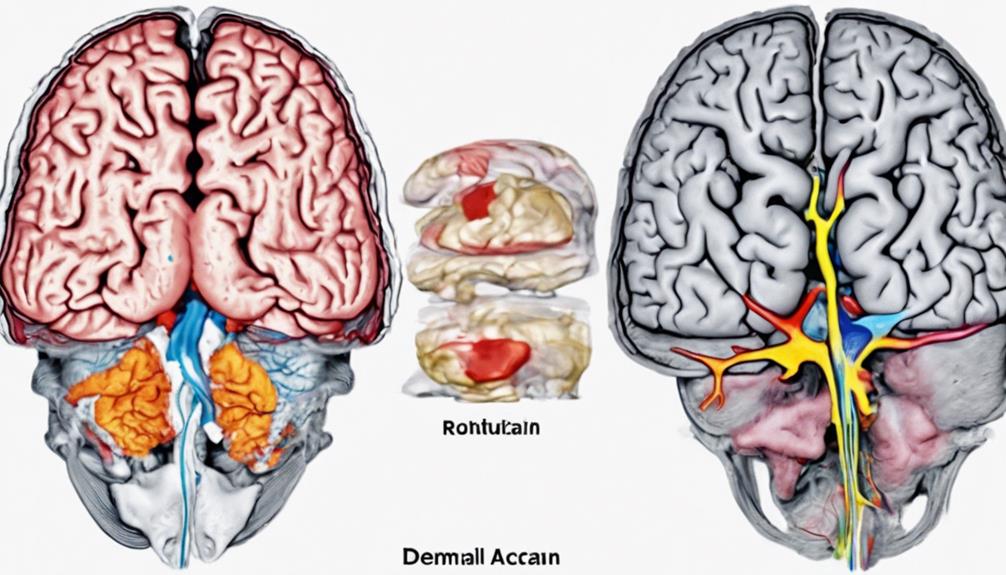
Utilizing advanced brain imaging techniques such as MRIs and CT scans allows for the precise tracking of structural changes and progressive brain atrophy over time in individuals with dementia. This monitoring is crucial for understanding the progression of the disease and evaluating the effectiveness of treatments.
- Detecting Alzheimer's Disease: Brain scans play a vital role in identifying the onset and progression of Alzheimer's disease through the observation of specific changes in the brain's structure.
- Assessing Disease Progression: Comparing current brain scans to previous ones enables healthcare providers to assess the rate of brain atrophy, providing valuable insights into the advancement of dementia.
- Monitoring Treatment Efficacy: By monitoring changes in the brain through scans, doctors can evaluate the impact of interventions, adjust treatment plans accordingly, and optimize patient care.
Understanding Normal Vs Dementia Brain Scans
Moving from the assessment of disease progression to the comparison of brain scans between normal individuals and those with dementia highlights distinct structural discrepancies indicative of the condition's impact on brain integrity. Normal brain scans typically exhibit a consistent brain structure devoid of significant abnormalities or signs of shrinkage.
In contrast, dementia brain scans often showcase brain atrophy, ventricular enlargement, and abnormal changes in specific brain regions. These deviations can manifest as altered brain volume, reduced cortical thickness, and compromised overall structural integrity. Additionally, dementia brain scans may reveal visible signs of damage such as white matter lesions not commonly observed in normal scans.
Understanding these disparities between normal and dementia brain scans is crucial for accurate dementia diagnosis and effective treatment planning. By analyzing the differences in brain structure and integrity, healthcare professionals can better tailor interventions to address the specific needs of individuals affected by dementia, ultimately enhancing their quality of life.
Frequently Asked Questions
Can You Tell by a Brain Scan if You Have Dementia?
Yes, brain scans can reveal signs of dementia by detecting brain shrinkage, atrophy, or abnormal structures. Specific patterns on scans indicate various types of dementia, like Alzheimer's or vascular dementia.
Amyloid PET scans identify amyloid plaques, a hallmark of Alzheimer's. Changes in brain structure visible on scans aid in early detection before symptoms appear.
Scans are vital for ruling out other conditions and tracking dementia progression.
How Your Body Warns You That Dementia Is Forming?
As our bodies undergo the early stages of dementia formation, subtle signs may emerge. These warning signals can manifest as changes in memory, language, behavior, and decision-making abilities.
Mood swings, disorientation, and withdrawal from social activities may also indicate the onset of dementia. Recognizing these indicators and seeking timely medical intervention can aid in the early detection and management of this condition.
What Do Dementia Eyes Look Like?
Dementia eyes typically exhibit reduced blinking, lack of focus, and a distant or vacant appearance. Changes in eye movements, like slow or uncoordinated gaze shifts, may also be noticeable. These manifestations reflect cognitive decline and difficulty processing visual information.
Individuals with dementia might struggle to make eye contact or engage with their surroundings. Understanding these eye-related signs can aid in recognizing and addressing cognitive impairments associated with dementia.
What Is the First Noticeable Symptom of Dementia?
Memory loss, akin to a scattered jigsaw puzzle, is often the initial sign of dementia. This puzzle, when incomplete, hints at the complexities within the brain.
Understanding this crucial clue allows for early interventions, enhancing the quality of life for those affected. Recognizing this symbol of cognitive decline prompts us to engage in proactive measures, seeking medical guidance to navigate the intricate landscape of aging and neurological health.
Conclusion
In conclusion, the intricate dance of neurons captured within brain scans serves as a symphony of clues in the diagnosis of dementia. Like skilled conductors, these imaging techniques reveal the discordant notes of structural changes, guiding clinicians towards tailored treatment plans.
As we unravel the enigmatic composition of the brain, we gain a deeper appreciation for the symmetrical beauty of normal brain function and the haunting melody of dementia's progression.
Dementia Care
10 Engaging Dementia Games for Cognitive Stimulation
Keen to discover how dementia games can boost cognitive health and well-being? Explore the world of games designed for memory challenges!
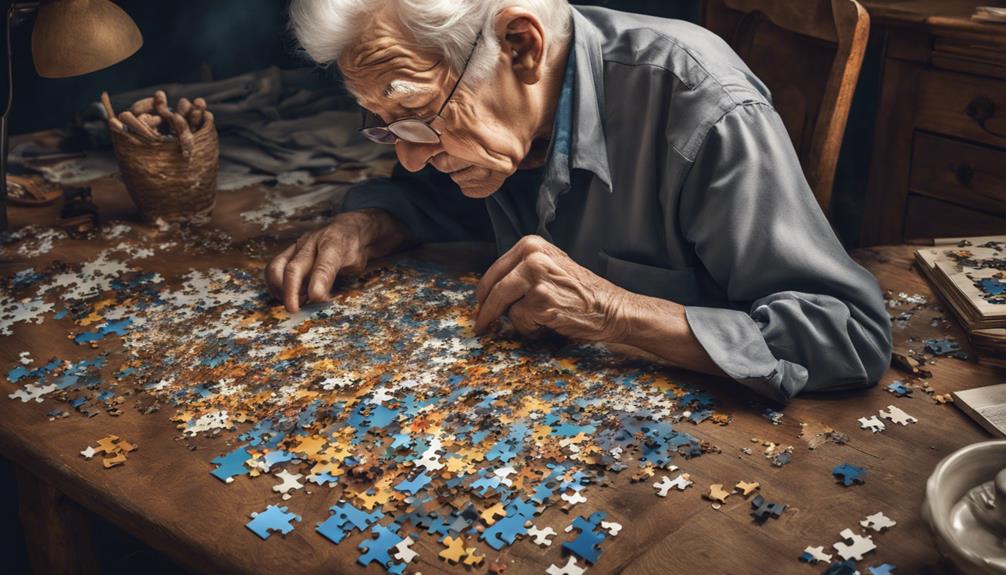
Concerning games designed for individuals with dementia, have you considered the possible impacts they might have on cognitive health?
From classic card games to innovative virtual reality experiences, the world of games tailored for individuals with dementia is vast and evolving.
These games not only entertain but also provide valuable mental stimulation and social engagement.
But what makes these games truly effective in enhancing cognitive functions and overall well-being?
Let's explore the fascinating realm of dementia games and their benefits in promoting brain health and quality of life for those facing memory challenges.
Key Takeaways
- Dementia games benefit cognitive function and social connections.
- Engaging activities like puzzles and board games improve mental stimulation.
- Brain stimulating games slow cognitive decline and boost self-esteem.
- Avoid complex, high-pressure games and opt for activities promoting social engagement.
Benefits of Dementia Games
Engaging in dementia games cultivates mental stimulation, fosters social connections, and boosts a sense of achievement for individuals living with cognitive challenges. These games offer a unique way to improve cognitive function and combat the effects of cognitive decline. By providing mental stimulation, they help enhance concentration levels, keeping the mind active and engaged.
Moreover, dementia games create opportunities for social interactions, allowing players to connect with others in a meaningful way. These interactions can lead to the formation of bonds and friendships, ultimately enhancing relationships and promoting a sense of community among players. The customizable options available in these games cater to individual preferences and cognitive abilities, ensuring that each player can participate at their own pace and comfort level.
Top Games for Dementia Patients
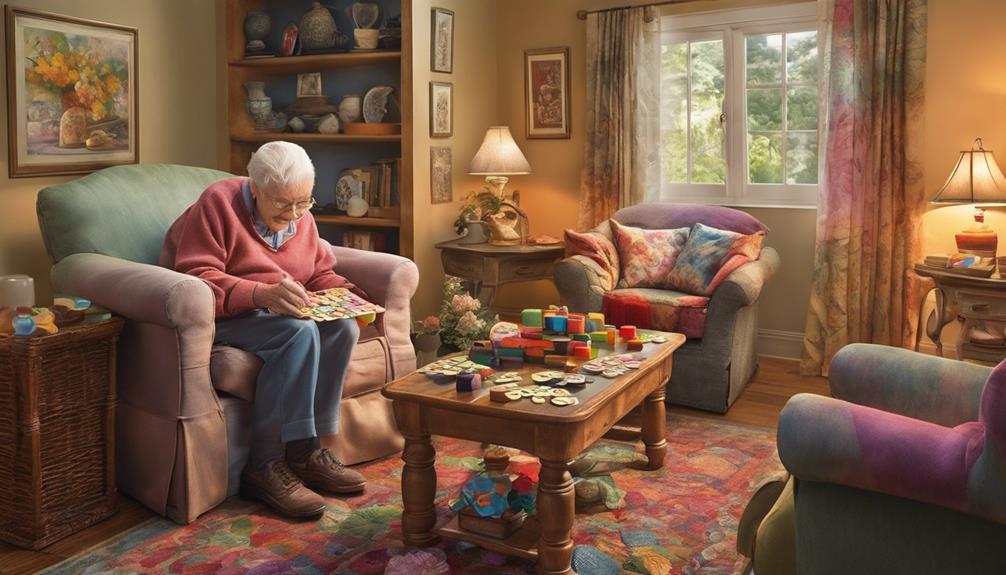
When considering activities beneficial for individuals with dementia, selecting the most suitable games can significantly enhance cognitive function and overall well-being. Dementia games such as board games, card games, video games, jigsaw puzzles, and more offer cognitive stimulation and promote memory retention. Below is a table highlighting some of the top games for dementia patients:
| Game | Benefits | Skills Developed |
|---|---|---|
| Jigsaw Puzzles | Memory recall, reasoning skills | Problem-solving |
| Card Games | Reasoning, problem-solving, memory, concentration | Hand-eye coordination |
| Video Games | Cognitive functioning, visual recognition, memory | Problem-solving |
Engaging in these activities not only provides entertainment but also encourages social interaction and mental engagement. Whether it's playing a round of cards, piecing together a puzzle, or enjoying a video game, these dementia games can help individuals maintain cognitive abilities and lead to a more fulfilling quality of life.
Engaging Activities for Cognitive Health
How can we incorporate stimulating activities to support cognitive health in individuals with dementia?
Engaging in brain games like word puzzles, jigsaw puzzles, and board games can significantly improve memory, reasoning skills, and overall cognitive function in Alzheimer's and dementia patients. Word and puzzle games such as crosswords and anagrams are effective in enhancing verbal learning and memory. Jigsaw puzzles not only support memory recall but also boost reasoning abilities. Additionally, dice games like Yahtzee and card games such as Uno can aid in numerical skills and concentration, which are essential for cognitive activity.
Board games like Monopoly and interactive video games like Wii Sports are also beneficial for older adults with dementia, as they help improve cognitive functioning and quality of life. By incorporating these games into daily activities, caregivers and healthcare providers can create a stimulating environment that promotes mental agility and memory retention in individuals with dementia. These engaging activities not only provide enjoyment but also offer valuable cognitive benefits for those living with dementia.
Avoid These Games for Dementia
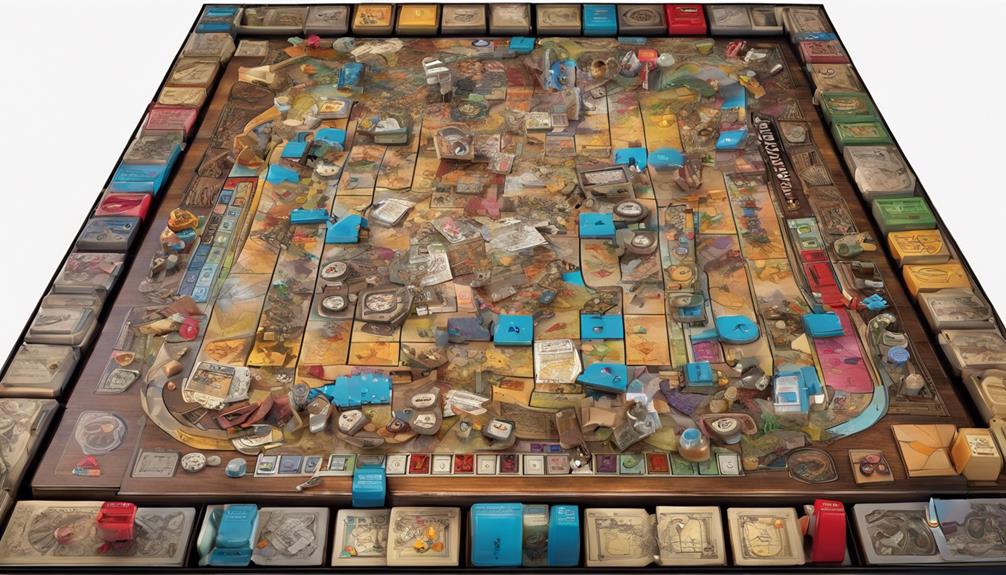
Complex and high-pressure games should be approached with caution when selecting activities for individuals with dementia, as they can lead to confusion and unnecessary stress. Electronic games, with their technical complexities, may pose challenges for dementia patients, potentially causing frustration and difficulties in gameplay.
Word-based games, while initially engaging, can become taxing and overwhelming in the later stages of dementia, making them less suitable for long-term enjoyment.
Time-based games, if not paced leisurely, can lead to increased stress and anxiety in dementia patients, detracting from the intended fun and cognitive benefits. Games that require quick decision-making under pressure should be avoided to prevent unnecessary strain on individuals with dementia.
Brain Stimulating Games for Dementia
After recognizing the potential challenges posed by certain types of games for individuals with dementia, it's important to shift the focus towards brain stimulating activities that can positively impact cognitive function and memory retention. Engaging in brain games has been shown to slow down cognitive decline in individuals with dementia. Activities such as puzzles, memory games, and cognitive stimulation games are known to have positive effects on mental acuity. These brain stimulating games offer a fun and interactive way to keep the mind active and engaged in dementia patients.
Regular participation in brain games can provide a sense of accomplishment and mental stimulation for individuals with dementia. The sense of achievement from completing a puzzle or remembering a sequence in a memory game can boost self-esteem and confidence. Moreover, the interactive nature of these activities promotes social engagement and cognitive development. By incorporating brain stimulating games into daily routines, caregivers and healthcare professionals can contribute to improving the quality of life for individuals living with dementia.
Frequently Asked Questions
What Games to Play With Someone With Dementia?
When playing games with someone with dementia, it's crucial to choose activities that are engaging and beneficial for their cognitive abilities.
Opt for games like jigsaw puzzles, word puzzles, dice and card games, and board games to help stimulate memory, reasoning, numerical skills, and concentration.
These activities can offer enjoyment while also providing mental stimulation and social interaction, which are essential for individuals with dementia.
What Are 3 Things to Never Do With Your Loved One With Dementia?
When caring for a loved one with dementia, it's important to avoid arguing or rushing them, as this can lead to frustration and confusion. Leaving them alone in unfamiliar places should be avoided to prevent accidents and disorientation.
Introducing sudden changes to routines or environments can trigger anxiety and disorientation, so it's best to stick to familiar settings and routines. Remember, patience and consistency are key to providing the best care for our loved ones with dementia.
How Do You Keep Dementia Patients Busy?
To keep dementia patients busy, we focus on engaging activities that stimulate their minds and encourage social interaction.
We prioritize games and puzzles that support memory recall, reasoning skills, and cognitive functioning.
It's important to provide a variety of options, such as dice games, card games, board games, and even video games, to cater to different interests and abilities.
Our goal is to create an environment that fosters mental stimulation and enjoyment for dementia patients.
How Do You Entertain Someone With Dementia?
We entertain someone with dementia by engaging them in activities that stimulate their cognitive functions and bring them joy.
It's essential to tailor activities to their preferences and abilities, whether it's playing games, doing puzzles, or simply reminiscing about the past.
Conclusion
In conclusion, dementia games offer a valuable opportunity for individuals to stay engaged, connected, and mentally sharp.
These games are like a breath of fresh air, providing a fun and interactive way to stimulate the mind and create lasting memories.
By incorporating brain stimulating activities into daily routines, we can help improve cognitive functions and promote overall well-being for those living with dementia.
Let's keep playing and thriving together!
Dementia Care
Does Jack Nicholson Have Dementia? The Truth Revealed
Intriguing speculation surrounds Jack Nicholson's recent behavior, leaving fans wondering: does the legendary actor have dementia?

Observations have been made about Jack Nicholson’s recent public appearances, with some noting a distinct shift in his demeanor and behavior. This has sparked concern among his fans and peers in the entertainment industry. Considering his illustrious career marked by displays of sharp wit and charisma, the question arises whether these changes might indicate a deeper issue.
Could the legendary actor be facing a health challenge that goes beyond the natural aging process? The speculation surrounding his well-being raises intriguing questions about the intersection of fame, privacy, and health in the life of a Hollywood icon.
Key Takeaways
- Concerns about Jack Nicholson's health raised due to cognitive decline observations.
- Understanding dementia crucial due to speculated concerns about Jack Nicholson.
- Early diagnosis of dementia essential for effective management and support.
- Importance of comprehensive medical evaluation to address potential dementia in Jack Nicholson.
Jack Nicholson's Early Career
During Jack Nicholson's early career, he took on various small roles in films and TV shows, eventually gaining recognition for his performance in the 1969 film 'Easy Rider.' It was this role that helped propel Nicholson into the spotlight and showcase his acting abilities. Following the success of 'Easy Rider,' Nicholson continued to impress audiences and critics alike with his versatility and talent.
One of the pivotal moments in Nicholson's early career came with the 1970 film 'Five Easy Pieces,' where he delivered a standout performance that earned him critical acclaim. This film not only solidified Nicholson's reputation as a skilled actor but also laid the groundwork for his future success in Hollywood. His ability to portray a wide range of characters with depth and authenticity set him apart in the industry.
With each role he undertook during his early career, Nicholson inched closer to his iconic status in Hollywood. His dedication to his craft and undeniable talent helped him carve out a place for himself among the industry's elite.
Current Health Status of Nicholson
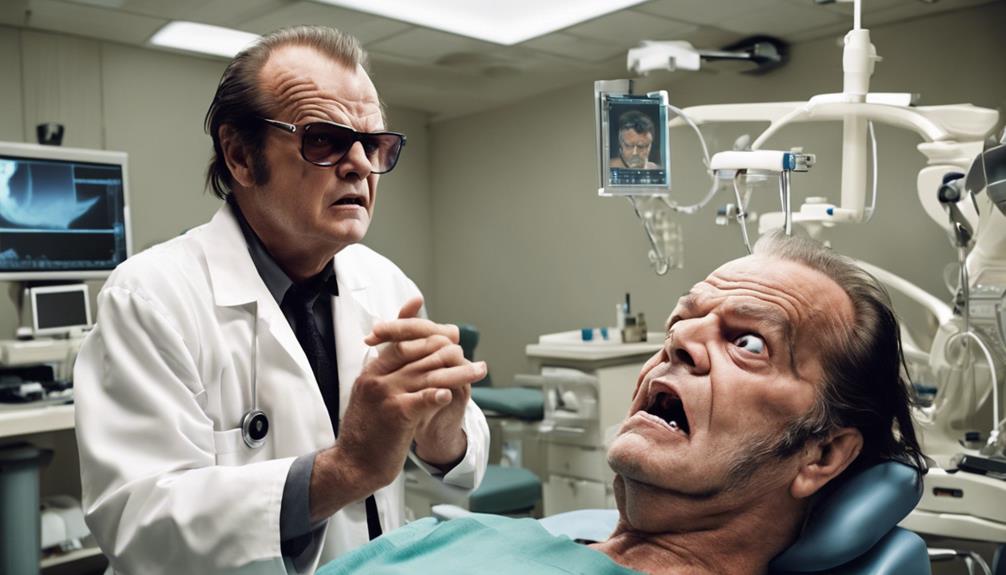
Amid growing concerns about his cognitive health, rumors surrounding Jack Nicholson's potential struggle with dementia have surfaced, particularly following his retirement from acting in 2010 due to memory loss. Nicholson's current health status has become a topic of interest due to the following observations:
- Reclusive Behavior: Nicholson has been increasingly reclusive, with limited public appearances and interactions, raising questions about his well-being.
- Friend Concerns: Friends of the actor have expressed worry about his slow decline and the lack of social engagements, indicating a potential deterioration in his cognitive abilities.
- Family Support: Family members, particularly his son and daughter, play a crucial role in Nicholson's life, serving as his primary connection to the outside world. Their involvement highlights the importance of familial support in managing health challenges such as dementia.
These factors combined paint a picture of a once vibrant Hollywood icon facing potential cognitive health issues, prompting concerns and speculation among those familiar with his work and life.
Understanding Dementia
Understanding dementia involves recognizing the general term for cognitive impairments that impact memory, thinking, and behavior, stemming from damage or degeneration of brain cells.
Dementia isn't a specific disease but a syndrome encompassing various conditions that lead to cognitive decline. Common manifestations of dementia include memory loss, confusion, communication difficulties, and changes in behavior.
Early diagnosis plays a critical role in managing symptoms and providing appropriate supportive care. While there's currently no cure for dementia, ongoing research aims to enhance detection methods and develop more effective treatments.
Individuals with dementia may benefit from interventions that focus on improving their quality of life and functional abilities. By understanding the complexities of dementia and its effects on individuals, caregivers and healthcare professionals can provide tailored support that addresses their unique needs and challenges.
Symptoms and Warning Signs

Moving from the broader understanding of dementia to specific symptoms and warning signs, social withdrawal and memory loss are commonly observed indicators that may suggest the presence of cognitive impairment. When considering the possibility of dementia in individuals like Jack Nicholson, it's essential to be mindful of the following key points:
- Communication Problems: Difficulties in expressing thoughts or following conversations can be early signs of cognitive decline.
- Visual Perception Issues: Changes in visual abilities, such as trouble reading or judging distances, could signal underlying dementia.
- Forgetfulness: Forgetting recent events, repeating questions, or relying heavily on memory aids may point towards a decline in cognitive function.
Caregivers and loved ones play a crucial role in recognizing these symptoms and warning signs in individuals like Jack Nicholson. Vigilance in monitoring changes in behavior and seeking professional evaluation can aid in early detection and appropriate management of dementia-related issues.
Medical Evaluation and Diagnosis
Upon assessing Jack Nicholson's cognitive health, a comprehensive medical evaluation and diagnosis are imperative to determine the presence and extent of any potential dementia-related issues. Given Nicholson's advanced age of 85 years and reported family history, the importance of early detection through thorough medical assessments cannot be overstated. A structured evaluation focusing on cognitive health, including memory, attention, reasoning, and communication, is essential in identifying any signs of cognitive decline. Biomarker research in Alzheimer's disease and dementia underscores the significance of proactive medical evaluations for individuals at risk, such as Jack Nicholson. To emphasize the critical nature of this process, we present a table illustrating the key aspects of medical evaluation and diagnosis in dementia assessment:
| Aspect | Importance |
|---|---|
| Cognitive Assessment | Evaluating memory, reasoning, attention, and perception abilities. |
| Medical History Review | Understanding past illnesses, medications, and family history. |
| Neurological Examination | Assessing reflexes, coordination, balance, and sensory functions. |
| Brain Imaging Studies | Utilizing MRI or CT scans to visualize brain structure and abnormalities. |
| Laboratory Tests | Conducting blood tests to identify potential underlying causes of symptoms. |
Frequently Asked Questions
What Disease Does Jack Nicholson Have?
We can confirm that Jack Nicholson's current health condition remains a subject of speculation. Reports suggest concerns about his well-being and mental state, with friends expressing worries about his decline, citing limited public appearances and social withdrawal.
While rumors suggest dementia due to his retirement from acting and memory loss, there's no official confirmation of any specific disease at this time. Nicholson's cognitive health continues to be a topic of interest and concern.
What's Happened to Jack Nicholson?
We've observed limited public appearances and reports of memory loss and social withdrawal concerning Jack Nicholson. Concerns about his health and well-being have escalated, with friends and close sources expressing worries about his cognitive decline.
Nicholson's retirement from acting in 2010, citing memory loss, adds weight to these concerns. The lack of recent sightings and reclusive behavior have intensified anxieties about his overall condition, prompting discussions about potential health issues.
Can You Slow Down Dementia if Caught Early?
If caught early, dementia progression can potentially be slowed down through lifestyle modifications, cognitive stimulation, and appropriate medical interventions. Regular physical activity, a balanced diet, mental exercises, and social engagement play crucial roles.
Early diagnosis allows for effective symptom management and care planning. Monitoring by healthcare professionals, along with support from caregivers, is vital. Timely interventions can help individuals with dementia maintain a better quality of life.
What Should I Do if I Have Early Dementia Symptoms?
If we notice early dementia symptoms, seeking a thorough evaluation from a healthcare professional is crucial. Engaging in cognitive activities, staying socially connected, and maintaining a healthy lifestyle are vital steps.
Early diagnosis aids in symptom management and future planning. Educating ourselves and loved ones about dementia helps us better understand and cope with the condition. Being proactive and seeking support can significantly impact our journey with dementia.
Conclusion
In conclusion, it's important to recognize the potential signs of dementia as we consider Jack Nicholson's health.
With his iconic career and memorable performances, it's crucial to understand the impact of cognitive decline on individuals, regardless of their fame.
As we navigate discussions about Nicholson's well-being, let's tread carefully, like walking on eggshells, and approach the topic with sensitivity and empathy.
Albert brings a wealth of knowledge and expertise to our writing team. With a background in caregiving and a deep understanding of the challenges faced by caregivers, Albert’s writing resonates with authenticity and empathy. He is committed to delivering high-quality content that empowers and supports caregivers on their journey.
-

 Dementia Care1 week ago
Dementia Care1 week agoHow Gabapentin Affects Dementia: A Comprehensive Guide
-

 Dementia Care2 months ago
Dementia Care2 months agoUnderstanding the Stages of Vascular Dementia: A Visual Chart Guide
-

 Dementia Care1 week ago
Dementia Care1 week ago5 Things You Need to Know About Jack Nicholson’s Dementia
-

 Medication Management1 month ago
Medication Management1 month agoGabapentin Side Effects: Memory Loss Concerns?
-

 Palliative Care for Parkinson's2 weeks ago
Palliative Care for Parkinson's2 weeks agoPalliative Care for Parkinson’s: A New Hope for Patients”
-

 Dementia Care2 months ago
Dementia Care2 months agoUnderstanding Narcissism and Dementia: A How-To Guide
-

 Caregiving Issues4 weeks ago
Caregiving Issues4 weeks agoWhat Is Respite Care for Elderly?
-

 Palliative Care for Parkinson's2 weeks ago
Palliative Care for Parkinson's2 weeks agoUnlocking the Secrets of Palliative Care for Parkinson’s Disease
